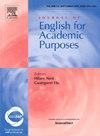Multilevel engagement in academic L2 reading: Developing and validating a scale
IF 3.4
1区 文学
Q1 EDUCATION & EDUCATIONAL RESEARCH
引用次数: 0
Abstract
This study aimed to develop and validate four self-report questionnaires related to four contextual levels of academic L2 reading engagement, namely, activity, session, course, and out-of-class, each incorporating behavioral, cognitive, and affective dimensions of engagement. The activity-level scale measured students' engagement in an L2 reading comprehension activity, which lasted several minutes; the session-level scale assessed students' engagement in academic L2 reading during class time lasting approximately 1–2 h; the course-level scale evaluated students' engagement in academic L2 reading in the classroom setting throughout a single academic term; and the out-of-class-level scale looked at students' engagement in the course-related academic L2 reading materials outside the class over the duration of the same academic term. To generate items, the researchers primarily drew on the engagement literature and adapted items from existing scales. Various processes were employed to refine the items and confirm their content validity, including expert reviews, focus group interviews, and pilot testing. Through Exploratory Factor Analysis (EFA), a three-factor structure, comprising behavioral, cognitive, and affective engagement factors, was identified for each scale level. Following this, each structure was analyzed as both a first-order and second-order factor model through Confirmatory Factor Analysis (CFA), resulting in a satisfactory model fit. Additionally, the convergent and discriminant validity of the structures, along with the composite reliability and Cronbach's alpha reliability of the scales, were established. These scales make a valuable contribution to the field of L2 engagement, enabling a multilevel and multifaceted investigation of learners' L2 reading engagement.
学术二语阅读的多层次参与:量表的开发与验证
本研究旨在开发和验证四份自我报告问卷,这些问卷涉及学术第二语言阅读参与的四个语境层面,即活动、会话、课程和课外,每个层面都包含参与的行为、认知和情感维度。活动水平量表测量学生在持续几分钟的第二语言阅读理解活动中的参与度;会话水平量表评估学生在大约1-2小时的课堂时间内对学术性第二语言阅读的投入程度;课程水平量表评估学生在一个学期的课堂环境中对学术性第二语言阅读的参与程度;而课外水平量表则考察了学生在同一学期的课外时间内对与课程相关的第二语言学术阅读材料的参与情况。为了生成项目,研究人员主要借鉴了敬业度文献,并从现有量表中调整了项目。我们采用了不同的过程来完善项目并确认其内容的有效性,包括专家评审、焦点小组访谈和试点测试。通过探索性因素分析(EFA),确定了每个量表水平的三因素结构,包括行为、认知和情感参与因素。随后,通过验证性因子分析(Confirmatory factor Analysis, CFA)将每个结构作为一阶和二阶因子模型进行分析,得到了令人满意的模型拟合。此外,还建立了结构的收敛效度和判别效度,以及量表的复合信度和Cronbach’s alpha信度。这些量表对二语阅读投入领域做出了宝贵的贡献,使学习者的二语阅读投入能够进行多层次和多方面的调查。
本文章由计算机程序翻译,如有差异,请以英文原文为准。
求助全文
约1分钟内获得全文
求助全文
来源期刊

Journal of English for Academic Purposes
Multiple-
CiteScore
6.60
自引率
13.30%
发文量
81
审稿时长
57 days
期刊介绍:
The Journal of English for Academic Purposes provides a forum for the dissemination of information and views which enables practitioners of and researchers in EAP to keep current with developments in their field and to contribute to its continued updating. JEAP publishes articles, book reviews, conference reports, and academic exchanges in the linguistic, sociolinguistic and psycholinguistic description of English as it occurs in the contexts of academic study and scholarly exchange itself.
 求助内容:
求助内容: 应助结果提醒方式:
应助结果提醒方式:


